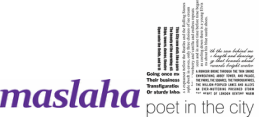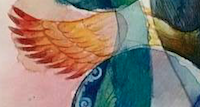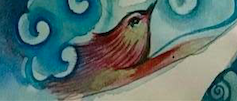what is a landai
|
A necessarily brief spotlight on this centuries-old poetic form.
The word ‘landai’ means “short, poisonous snake” in Pashto, which is a language spoken on both sides of the Afghanistan-Pakistan border. The word also refers to a form of folk poetry composed of two lines and 22 syllables that is often spoken or sung. |
It is not clear where and when Pashto landais originated. One theory traces the origins of the landai back to the Bronze-Age arrival of Indo-Aryan caravans to Afghanistan, Pakistan, and India around 1700 BCE. The poems potentially evolved from the call-and-response form of communication these caravan camel trains necessitated.[1]
|
|
Bilquees Daud presents her own personal and compelling story of how landai forms and themes developed.
Her mother recalled how autumn would be the season when men would leave her village Sarawza to work in neighbouring countries, leaving the village bereft of men. The rest of the village, primarily women, would sit together talking about their male counterparts and recite poetry in remembrance of their male family members.[2] This is partly why, although both men and women have produced landais, the form is predominantly associated with women. What is clear is the oral aspect of this poetic tradition. For centuries, oral culture traditions have existed in Afghanistan, and dominated literary output. Social beliefs, norms and values were also transmitted orally, whilst non-formal education depended upon oral transmission.[3] Landais arose from tribal, village areas where the populace was often illiterate, be it as a result of lack of security, lack of educational opportunities or other reasons. This necessarily affected the form of the landai, which is unique and doesn’t exist elsewhere in the world other than amongst the Pashtun population in Afghanistan and Pakistan.[4] The poems are formed of a single couplet of two, usually unrhymed lines, the first line containing 9 syllables, the second 13. The poem usually ends with a ‘ma’ or ‘na’ sound. The language in these couplets is typically plain and easily understood, and the shortness of the form most likely developed for ease of memorisation. For perhaps similar reasons, the poems often have a musical quality similar to a lullaby when sung in the Pashto language. Despite the musicality of the form, landais’ are said to ‘cut like a knife’[5] and its subversive aspects exist across many levels. In a country where women are forbidden from reading or writing poetry, the very act of saying a landai constitutes an act of resistance. Thematically, the content is often sharp, biting and witty, treating subjects such as war, separation, homeland, grief or love.[6] These tropes reappear in contemporary landais, which remix content from traditional landais and replace archaic references with more contemporary ones, such as drones and the White House. "my darling you are just like America, Taboo references to sexuality and masculinity abound, especially in more contemporary landais. These landais thematically rebel against dominant notions of Afghanistani women as silent and submissive, complicating relations of gender in Afghanistan, as they simultaneously honour and sharply criticize and humiliate Afghanistani men, whilst denouncing imperialistic tendencies of various Western powers.
Not only the subject matter, but also the mode of transmission constitutes a risk for Afghan women. Landais are mostly sung, and singing is considered inappropriate, taboo behaviour; a woman singing in Afghanistan may be considered immoral. Similarly, the musical drum, an instrument that has been banned by the Taliban, often accompanies the singing of landais, adding a further layer of danger. This danger is somewhat mitigated by the anonymity that has been a constant feature of landai production particularly in villages, as well as its collective nature. The landai form continues to be produced, spoken and celebrated by collectives such as Mirman Baheer, Afghanistan’s largest women’s literary society, who are also one of our partners for this project. Facebook has also become a widely used medium to produce and disseminate landais, especially by Afghanistani émigrés. [1] https://www.poetryfoundation.org/media/landays.html [2] Bilquees Daud, Pashto Landay: A Mirror of People’s Passion, Kabul Center for Strategic Studies (2012) [3] Ibid [4] Ibid [5] Nada Rajan, ‘Afghan Landay – A Voice of Rebellion’ [6] https://www.poetryfoundation.org/media/landays.html [7]Translation from Griswold, E, I am the Beggar of the World (2014) |




